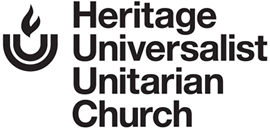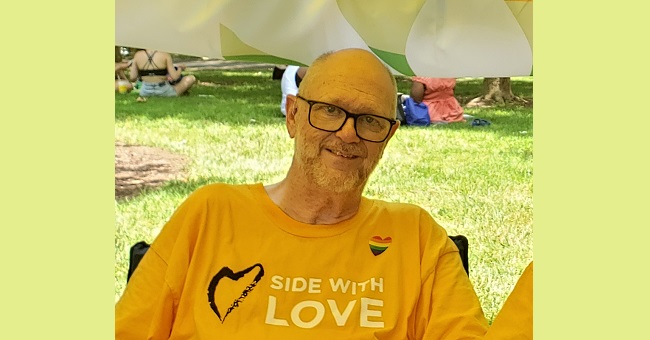Opinion
by Bob Lamb
You have read a lot recently in this space about things going on at the Unitarian Universalist Association (UUA) level, especially the review and rewrite of Article 2 of the Bylaws, which contains the seven principles. I want to provide my perspective as an observer and sometimes delegate for Heritage UU Church at the UUA General Assembly for the last seven years.
I came to UU looking for a religion where I felt comfortable as an atheist/ maybe agnostic/ quite possibly spiritual person. By religion I mean an organized movement focused on common goals and desires derived from a sense of something true and necessary in all people. I also mean a movement filled with joy and spirit. My religious experience had been Pentecostal churches both white and black. I loved the energy, never bought the message.
A work colleague said, “UU? That’s nothing but a Democratic Social club!” But it didn’t feel like that at Heritage. Heritage felt like love. I attended a couple of other UU churches and didn’t get that feeling, though. My first experience at GA reinforced what I felt at those other churches; UUism was neither a religion nor a Democratic club. It was simply a debate society for left leaning intellectuals. I felt religious when marching with the Side With Love movement, or with Black Lives Matter, but those efforts did not seem to be at the heart of UUism.
What was missing? This excerpt from an article by Rev. Mark Morrison-Reed in the Fall, 2017 edition of UU World tells a part of the story:
A 1989 study of UU worship preferences tells us that African Americans don’t fit the UU pattern. What was most important in worship for 74.5 percent of UUs overall was “intellectual stimulation.” What was most important for African American UUs who responded to the survey? “Celebrating common values” (chosen by 69 percent), then “hope,” “vision,” and “music”—all before “intellectual stimulation.”
Why did African American culture, experience, and sensibilities remain invisible?
There was cultural dissonance between a people who, having political rights, prized “intellectual freedom” in their struggle with orthodoxy and those for whom the struggles for basic freedoms—political and spiritual freedom—were paramount. But the white conscience does not want to know. Not knowing the history and not being reminded during worship means white liberals don’t have to feel guilty or be confronted by the emotional aridness of UU worship. (emphasis added)
The full article can be found here. It is an excellent survey of how African American UUs have been marginalized, ignored, and neglected throughout the history of Unitarianism.
So I found UU “worship” to be unfocussed and emotionally arid. HUUC was better than others–there’s that Universalist strain coming through.
Then Ellie and I attended the messy, amazing, chaotic, transformative GA in New Orleans, where Susan Frederick-Grey was elected President (not my vote, but I am very happy after seeing her in action) and the Commission on Institutional Change was appointed. And the rest, as they say, is history, leading to where we are now.
Where are we? First, GAs are a whole lot more interesting—singing, dancing, real preaching, actual emotion! But more importantly, African Americans and other BIPOC (Black, Indigenous, and People Of Color) people are in many positions of power and authority in our faith, positions they were unjustly denied in our history. And they are guiding UUs with great (religious) fervor to attack America’s biggest issue that has infected our institutions and held our country back in all our attempts to unite to make a better world: Racism, and especially the institutional racism that permeates our culture that we can’t even acknowledge because it is so much a part of everything.
As President Frederick-Grey said at the 2018 GA, this is no time for a casual faith.
So now I ask that you reread the proposed new Article 2 section on values and covenant, with my emphasis on the covenantal words. What’s different from our principles? First, everything is based on love—not even mentioned in our principles. Second, we are called to action—not the wimpy “affirm and promote” language of the principles. They want passion. They want direction. They want us to be a religion that stands for something. So do I.
C-2.2. Values and Covenant.
Love is the enduring force that holds us together.
As Unitarian Universalists in religious community, we covenant, congregation-to-congregation and through our association, to support and assist each other in engaging our ministries. We draw from our heritages of freedom and reason, hope and courage, building on the foundation of love.
Love inspires and powers the passion with which we embody our values. Inseparable from one another, these shared values are:
Justice. We work to be diverse multicultural Beloved Communities where all people thrive. We covenant to dismantle racism and all forms of oppression within individuals and our institutions. We are accountable to each other for this work.
Generosity. We cultivate a spirit of gratitude and hope. We covenant to freely share our faith, presence, and resources.
Transformation. We adapt to the changing world.
We covenant to collectively transform and grow spiritually and ethically. Evolution is fundamental to life and to our Unitarian Universalist heritages, never complete and never perfect.Pluralism. We celebrate that we are all sacred beings diverse in culture, theology, and experience. We covenant to learn from one another and openly explore the depth and breadth of our many wisdoms. We embrace our differences and commonalities with love, curiosity, and respect.
Equity. We declare that every person has the right to flourish with dignity and worthiness. We covenant to use our time, wisdom, attention, and money to build and sustain a fully inclusive and accessible community of communities.
Interdependence. We honor the sacred interdependent web of all existence. We covenant to care for and respect the earth and all beings by fostering relationships of mutuality. We work to repair the bonds we have broken.
Finally, the proposal adds this to the freedom-of-belief clause: “In expressing our beliefs, we do so in the spirit of love, in ways that further Beloved Community.”
Beloved Community is where everybody helps each other, everyone gets along, everyone looks for the common good. Look it up and you’ll find most of the references are to Martin Luther King, Junior. It is what he was talking about at the end of his “I Have a Dream” speech. So all they are saying is, show love when you express your opinions. Here at Heritage we are bound by a wordier covenant with the same essential meaning (from our website):
Our Pledge for Living in the Spirit of Community
We, the members and friends of Heritage Universalist Unitarian Church, seek, encourage, and support the continued spiritual growth of our diverse community.
In support of this pledge, I accept responsibility for my words and actions and seek to understand other’s concerns and viewpoints.
I will listen actively to others, asking for clarification to avoid misunderstanding.
I will express my thoughts and feelings in a non-judgmental way.
I will seek to resolve significant conflicts directly in the spirit of loving-kindness.
I will refrain from gossip and hurtful comments.
I will be welcoming to visitors and others.
I will honor confidences that have been shared with me.
I will seek out the opinions of those who will be affected by my decisions.
I will carry out my church responsibilities in a timely manner.
We, being human, may fail to meet our pledge many times. I will seek to heal the hurt in myself, and others, when I and they fall short.
So the UUA is starting to be a religion, with service, passion, and direction, focused on love. There is also a lot of talk about the sacred and divine. Sound familiar? Read the HUUC covenant.
The UUA is looking more like Heritage every day. I love it.
Photo of Bob Lamb by Alison Lang Hickey.

